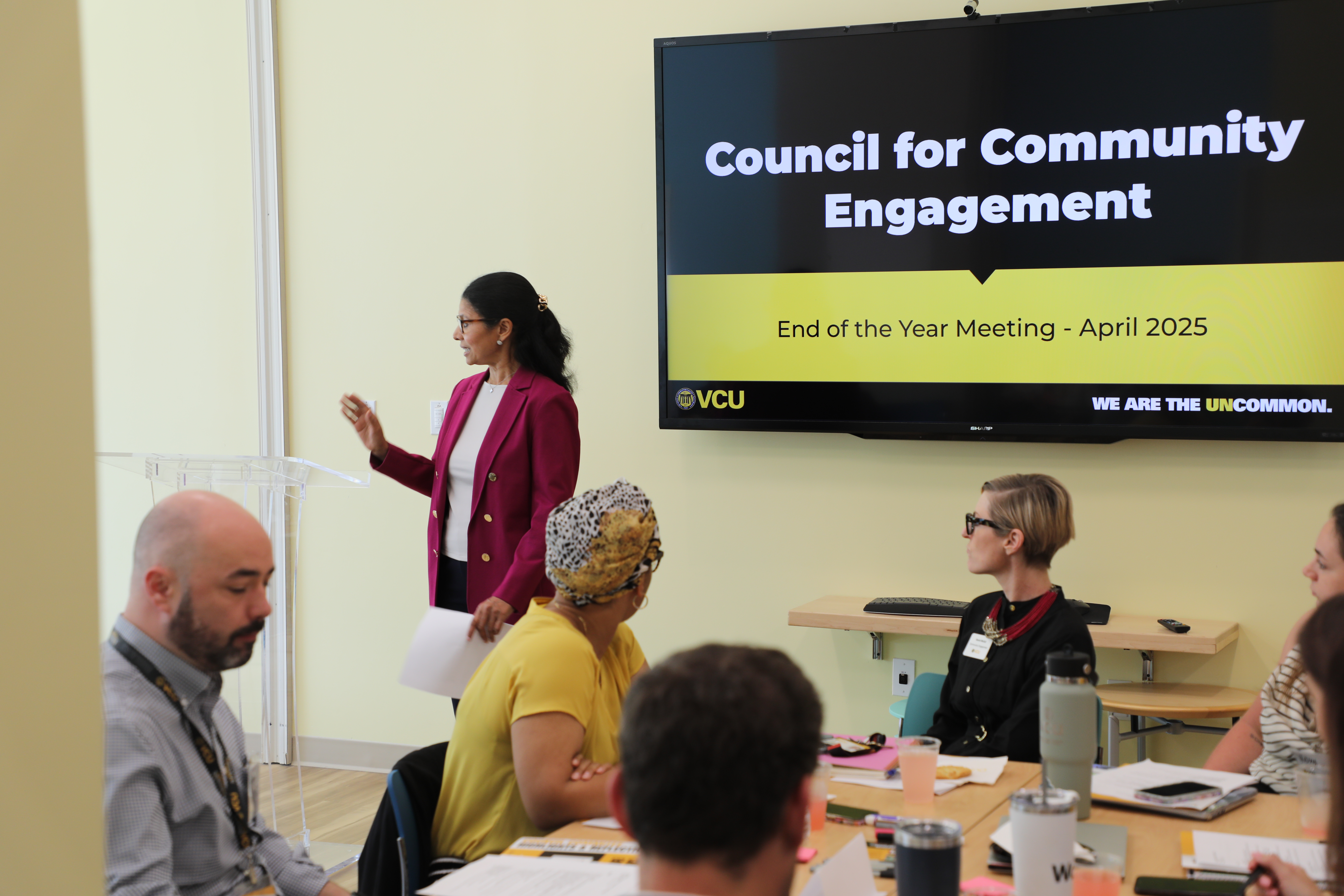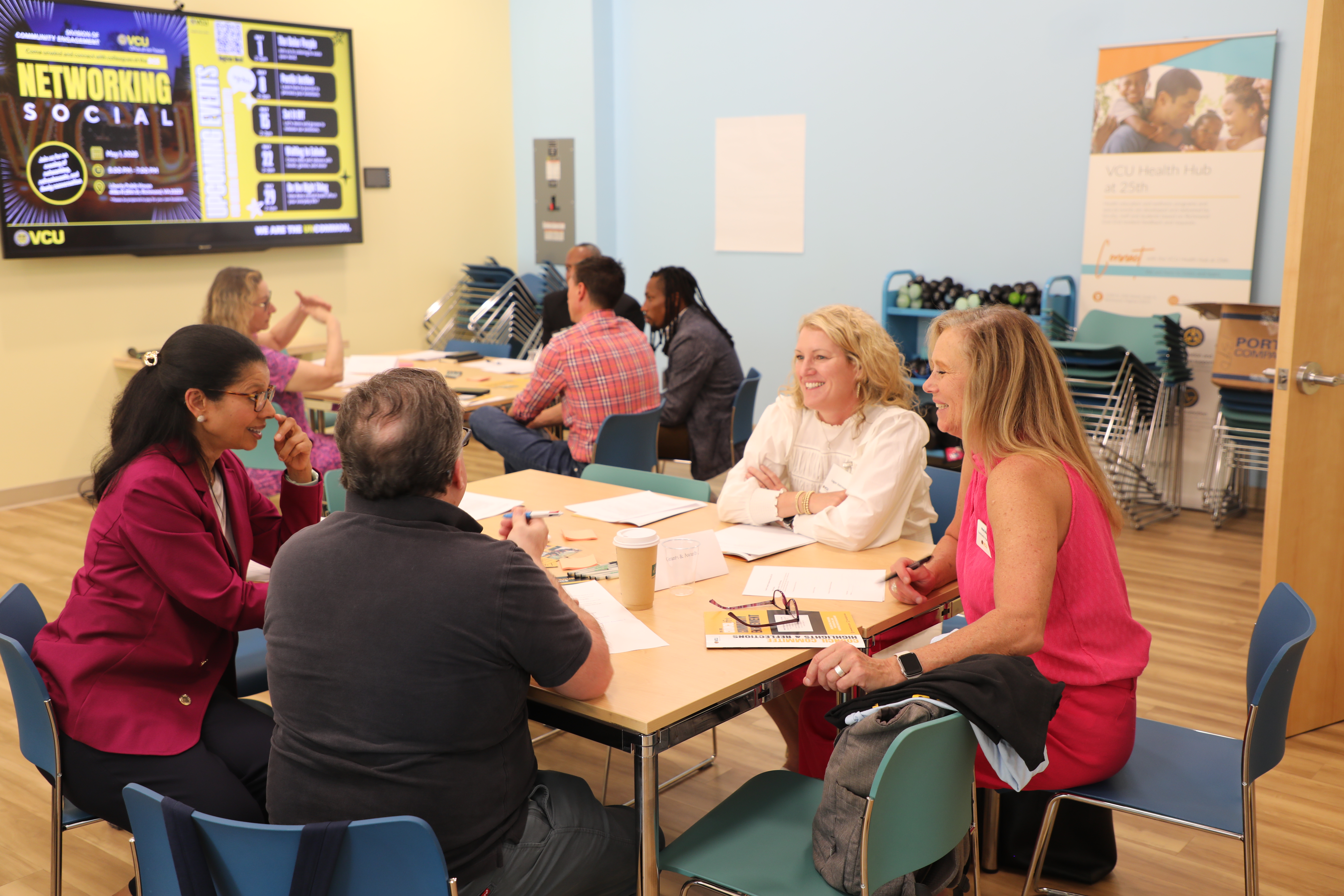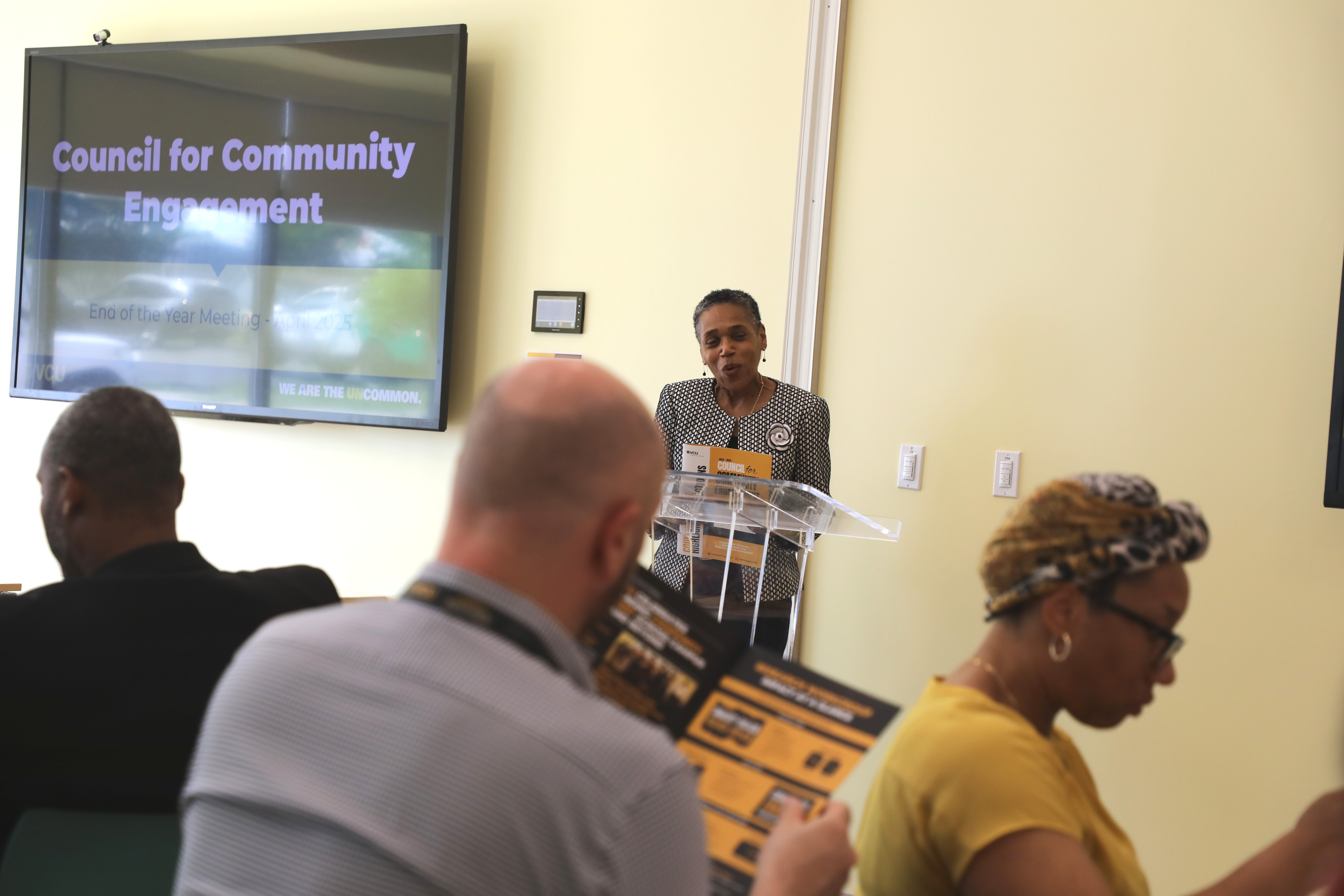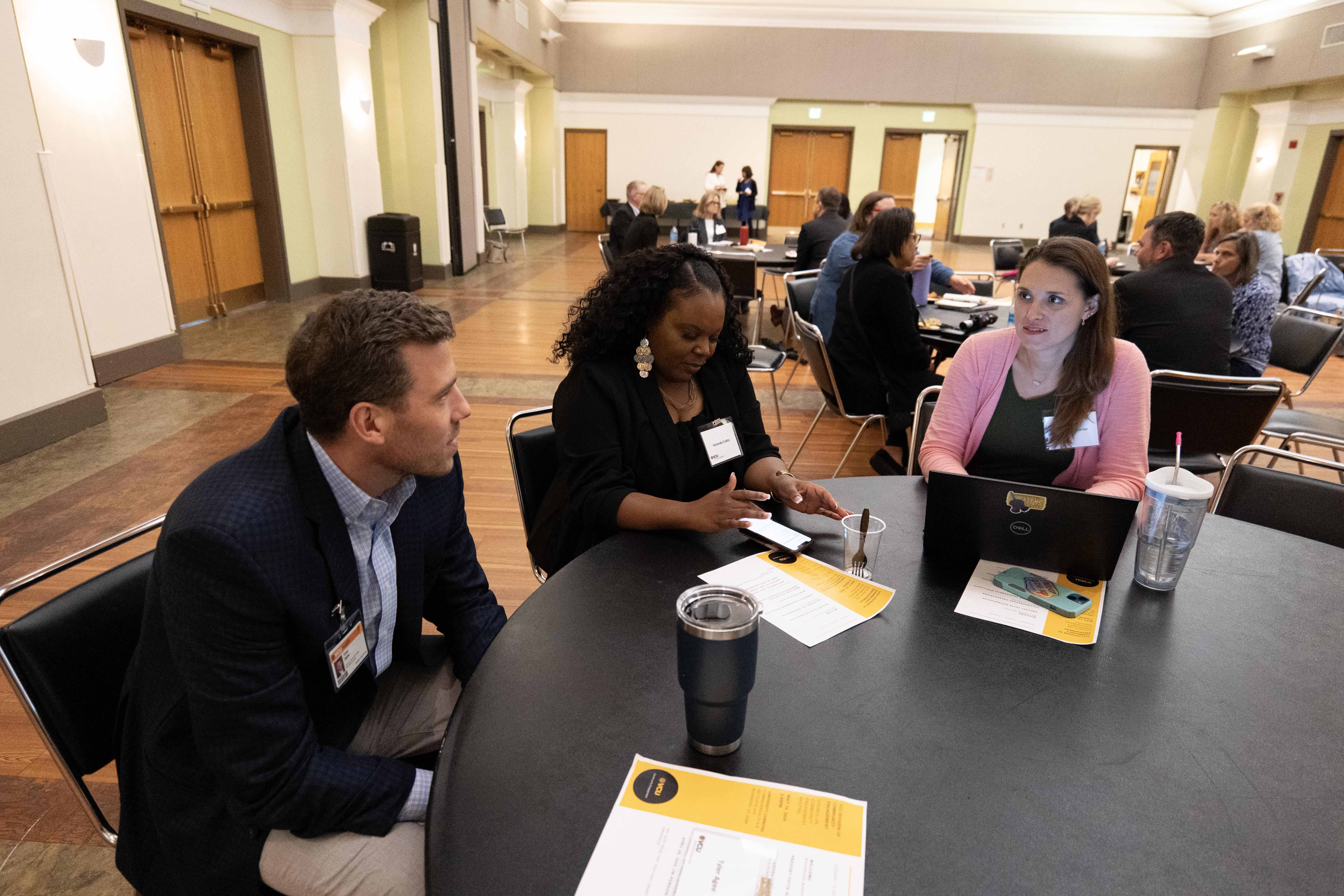


Council for Community Engagement
VCU’s new strategic plan, “Thriving Communities,” reaffirms the university’s commitment to the importance of university-community partnerships. One of the four themes in the previous strategic plan states that VCU will “become a national model for community engagement and regional impact.” The Council for Community Engagement assembles representatives from all academic and major support units in an effort to define, coordinate, and promote community engagement activities of the university.
The purpose of the council is
- Strategic Leadership: Providing strategic direction and vision for community engagement efforts that resonate with the goals outlined in VCU’s strategic plan, setting objectives, and guiding their implementation.
- Alignment Facilitation: Facilitating collaboration and alignment among different units, departments, and community partners involved in engagement activities to address siloed work and maximize community benefit and university impact, in line with VCU's mission and strategic plan.
- Resource Guidance: Providing guidance on resource allocation to support, reward, and build capacity for community engagement efforts while advocating for the integration of community engagement across all aspects in alignment with VCU’s strategic priorities.
- Advocacy and Impact Assessment: Advocating for the value of community engagement both within and outside the institution and assessing the impact of engagement efforts through metrics and evaluation criteria consistent with VCU’s strategic goals.
Council Membership
Duties of the members include:
- Attend Council meetings and serve as a liaison between the Council and your unit.
- Share your insights and experiences, including strengths and challenges, to support alignment with the University's community engagement goals.
- Collaborate with your unit or group to provide valuable insights into effective practices for advancing the University's community engagement objectives.
- Offer expertise to address infrastructure and other obstacles that could impede the University's impact at local, regional, and national levels.
- Identify opportunities for collaboration and alignment to break down silos and enhance the University's overall impact.
- Actively participate in one workgroup and attend workgroup meetings.
Members also serve on one of the Council’s standing committees:
The goals of the Infrastructure and Policy work group include:
- Identify and address infrastructure and policy barriers to community engagement efforts
- Steward Carnegie Community Engaged University Recertification Process and consider how the process can help meet other workgroup goals
- Review existing and develop new policies and procedures as needed that support community engagement efforts
- Coordinate with other committees to ensure policies and infrastructure align with strategic goals
- Advocate for resources and support for community engagement efforts
Workgroup Members
- Stephen Barr, Director of Business Services
- Adrien DeLoach, Executive Director, Division for Student Engagement & Impact, Office of the Senior Vice President for Health Sciences (Co-Chair)
- Shari Garmise, Community Engagement, Co-Chair
- Chris Marcoux, Director of Analytics, Office of the provost, IRDS
- Ezrah Medina, Assistant Director of Grants & Contracts Accounting, Controller’s Office - Grants & Contracts Accounting
- Elvin Price, Associate Professor, School of Pharmacy, DPOS, iCubed Health and Wellness Across the Lifespan core
- Sarah Raskin, Wilder School
- Rich Sliwoski, AVP Facilities Management, Administration
The goals of the Partnerships work group are to:
- Identify opportunities for synergistic initiatives that align with community needs and Quest 2028
- Ensure that partnerships align with and contribute to Quest 2028
- Establish robust metrics and assessment tools to measure the impact of partnership initiatives
Workgroup Members
- Verenda Cobbs, Senior Manager for Civic Innovation and Transformation
- Brent Fagg, M.S.. Assistant Director for Innovation
- Danielle Pearles, Senior Associate Director, Employer & Experiential Development, VCU Career Services (ALT)
- Katie Ferguson, Director of Corporate Relations, DAR - Corporate Relations
- Michael Gesme, Senior Program Manager, Massey Cancer Center, Community Outreach and Engagement
- Kevin Harris, Ph.D. Senior Associate Dean for Diversity, Equity and Inclusion
- Luke Shrader, Officer, Community Policing/Crime Prevention
- Teresa Mealha Salgado, Director/Assistant Professor, Center for Pharmacy Practice Innovation
- Tyler Agee, Director of Community Health, Division of Community Health, VCU Health System
Partnership Workgroup Summary
The VCU Council on Community Engagement Partnerships Workgroup is dedicated to fostering meaningful relationships across the VCU One Community and its Priority Partner communities, engaging internal VCU units, departments, and external stakeholders. The workgroup focuses on developing strategic partnerships that support community initiatives, promote civic engagement, and contribute to the university’s and health system’s mission of service.
Key priorities include supporting VCU-wide initiatives, collaborating with external stakeholders within Priority Partner communities, and organizing events that highlight community engagement efforts. The group serves as connectors, facilitating relationships between VCU departments, VCU Health System, and community partners to enhance collaboration and create impactful outcomes.
In addition to building connections, the workgroup is focused on establishing and sharing best practices for community engagement, promoting information-sharing, and supporting colleagues across VCU. Through these efforts, the group ensures that engagement strategies are aligned and effective, enabling stronger community partnerships and successful initiatives.
A central project that the group will support will include the implementation of Collaboratory, a virtual platform designed to enhance collaboration by providing an accessible Partnership Database for VCU’s partners, faculty, and departments. The workgroup is actively involved in the rollout of this platform, collecting feedback and ensuring it meets the needs of its users. This initiative is part of a broader effort to support VCU’s pursuit of the prestigious Carnegie Classification for community engagement.
Members are encouraged to reflect on their roles and how their departments contribute to these partnerships. The workgroup emphasizes transparency, sharing meeting notes, and fostering open communication to ensure alignment with VCU’s Quest 2028 strategic goals of building thriving communities. Regular monthly meetings provide a forum for discussion, collaboration with colleagues, and updates on ongoing initiatives.
The goals of this work group include:
- Identify and establish training opportunities for students, staff, and faculty in community-engaged research best practices
- Operationalize and identify opportunities to develop, coordinate and implement training aligned with the Quest 2028 Thriving Communities metric “to increase training opportunities”
- Identify and define best practices for training approaches in community engagement and outreach
- Identify training opportunities and collaborations that provide community benefit and relevance
Education Workgroup Members:
- Vaughn W. Garland, VCU Mary and Frances Youth Center (Co-Chair)
- Shanza Isom, VCU Engaged Transformative Learning (Co-Chair)
- Kaylynn Hill, Assistant Director of Regional Alumni Engagement
- Jo S. Murphy, VCU Forensic Science
- Michelle McGregor, VCU School of Dentistry
- Jacqueline Smith-Mason, VCU Honors College
- Maggie Tolan, VCU Strategic Enrollment Management and Student Success
- Lorielle Bouldin, VCU Division of Community Engagement
Community Engagement Strategic Priorities and Metrics
- Establishing Infrastructure for Growth and Adaptation. “Training, Budget, Carnegie Community Engaged re-classification, Partner and project audits.”
- Prioritize Economic Development. “Training and workforce development distribution pipeline, Procurement and contracting.”
- Skill building. “Training in standards of excellence, Stackable badging.”
- Addressing Societal Grand Challenges. “Increasing coordinated programs and interventions in partner communities.“
- Place-Based Assets. (Mary and Frances Youth Center and VCU Health Hub at 25th).
The goals of the economic development work group are to
- Promote equitable economic growth in alignment with civic engagement principles.
- Identify how to strengthen collaborations with local communities to facilitate economic development.
- Enhance workforce development opportunities in support of economic growth.
- Identify how to support innovation and entrepreneurship as drivers of economic development.
- Leverage public-private partnerships to advance economic development initiatives.
Workgroup Members
- Stephen Davenport, Assistant Vice President for Social & Economic Development
- Garret Westlake, Associate Vice Provost for Innovation, Da Vinci Center
- Alison Miller, Interim, Assistant Vice President, Human Resources, VCU Human Resources
- Elizabeth Prom-Wormley, Associate Professor, Population Health/Department of Epidemiology
- James Gahagan, Interim Associate Vice President for Transformative Student Experiences
- Aloni Hill, Assistant Professor, Richard T. Robertson School of Media and Culture
- Edward Howard, Director of Operations, VCU Online, and Continuing and Professional Education
- Ann Kildahl, Director of Sustainability
- John McHugh, Director of Procurement Services, Procurement Services
The goals of the Grants and Awards work group are to :
- Recognize and promote outstanding community engagement and research efforts by VCU faculty, staff, and students, highlighting their contributions to the university's mission and Quest 2028
- Assess the impact and outcomes of funded projects to ensure they align with the community's needs and the university's goals
- Gather feedback from the community and grant recipients to continually improve the grants and awards program
Workgroup Members
- Misti Mueller, Executive Director, Mary and Frances Youth Center
- Ariana Bracalente, Director of Philanthropic Grants, Development and Alumni Relations
- Logan Vetrovec, Director, Education and Research, Office of Health Equity
- Jose Alcaine, Ph.D., director of research services in the Office of Research and Faculty Development and affiliate faculty in the Department of Foundations of Education at the VCU School of Education,
- Lydia Klinger, Director of Strategic Collaboration
- Glenny Escotto, Senior Project Manager, VCU Massey Cancer Center
The goals of the research workgroup are to:
- Identify and propose solutions for infrastructure barriers in community-engaged research.
- Recommend ways to recognize community-engaged research in faculty promotion and tenure processes and reward all faculty for their involvement.
- Identify training, support, and resources to enhance research skills and capacity for successful community-engaged funding
Workgroup Members
- Maghboeba Mosavel, Associate Vice President for Community Partnerships (co-chair)
- Caroline Cobb Amey (co-chair)
- Amy Salisbury, Associate Dean for Research, Nursing
- Jered Wendte, Research Associate, School of Nursing/MHWP/RHWP
- Emily Zimmerman, Associate Professor, Center on Society and Health/Epidemiology
- Stacy Johnson, EEO-AA Manager, VCU Health - Office of Diversity, Equity, and Inclusion
- Faye Belgrave, Chief Diversity Officer
- Susan Bodnar-Deren, Associate Professor, Department of Sociology
- Camille Coy, Director for Strategic Initiatives, Enterprise Marketing and Communications
- Jill Blondin
- Faika Zanjani, Associate Director of Academic Programs & Research Training, Institute for Inclusion, Inquiry and Innovation
- Michael Newsome
- Jill Bowman
Updates
Stay up-to-date with the latest developments from the Council for Community Engagement.
